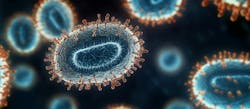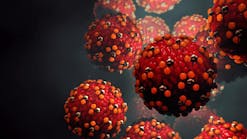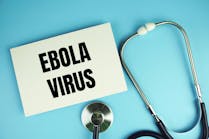A cardiac MRI of athletes who had COVID-19 is seven times more effective in detecting inflammation of the heart than symptom-based testing, suggests a study led by researchers at The Ohio State University Wexner Medical Center and College of Medicine with 12 other Big Ten programs.
The findings are published online by JAMA Cardiology.
The study of 1,597 COVID-19 positive Big Ten athletes who had cardiac magnetic resonance (CMR) screening found 2.3% were diagnosed with myocarditis and most didn’t exhibit symptoms of the rare disease, a leading cause of sudden death in competitive athletes. Of the 37 athletes diagnosed with myocarditis, 28 didn’t exhibit symptoms.
“This is the largest study of college athletes and comprehensive cardiac evaluation including cardiac MRIs. We were surprised to find the majority of cases were asymptomatic. We found myocardial changes among those who didn’t describe cardiac symptoms. What we don’t know is if this is clinically significant for the athlete.” said Curt Daniels, Cardiologist and Professor at the Ohio State Wexner Medical Center who led a team of 30 researchers on the study.
In September 2020, the Big Ten Conference mandated advanced testing for all COVID-19 positive athletes before they could return to play, citing studies that showed myocardial inflammation in patients who recovered from COVID-19. The incidence of sudden cardiac death in collegiate athletes has been estimated at one per 50,000 per year. Myocarditis is usually caused by a viral infection and is more common in males than females.
The conference formed the Big Ten COVID-19 Cardiac Registry to gather scientific data to help establish guidelines on when players could safely resume playing sports. The Ohio State University Institutional Review Board oversees the registry.
Thirteen Big Ten universities agreed to share data about athletes with COVID-19 from March 1, 2020, to Dec. 15, 2020. The study focused on the results of athletes who had cardiac screenings, which included CMRs, electrocardiograms (electrical signal of the heartbeat), echocardiograms (an ultrasound of the heart) and blood tests to evaluate for myocardial inflammation or injury. Researchers found that CMR was highly effective at detecting both symptomatic and asymptomatic myocarditis as well as allowing athletes to immediately resume their sport if screenings were normal. With this protocol, 97.7% of the Big Ten athletes were cleared to return to exercise and competition.
Researchers of the Big 10 study recommended further studies evaluating which athletes would benefit from CMR testing following COVID-19 infection. However, they noted several obstacles with CMR screening, including accessibility and expertise required for interpretation after a positive COVID-19 diagnosis.





